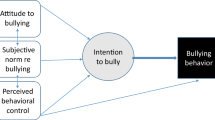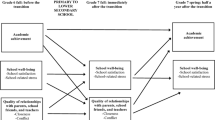Abstract
Interpersonal problem-solving ability takes an increasingly important role in the socialization process during childhood. This paper describes the development and preliminary evaluation of the interpersonal problem-solving inventory for elementary school students (IPSI). The IPSI is a process measure structured into five subscales: Positive problem-solving behavior; Negative problem-solving behavior; Rational problem-solving behavior; Impulsive behavior; and Avoidance behavior. The scale was administered to a Vietnamese elementary student sample that consists of 437 third grade students (M = 8.67, SD = 0.47). The reliability of the tool was reported by calculating internal consistencies (Cronbach’s α = .88; McDonald’s ω = .85). The construct validity of IPSI was investigated by using exploratory factor analysis (EFA) to explore the emerging factor structure of IPSI on the first data set. The confirmatory factor analysis (CFA) was performed on the second data set to define theory-driven five-factor structure of IPSI in comparison with any structure emerged from EFA. The CFA findings indicated that the data verified the theory-driven five-factor model of IPSI. The initial testing of the five-factor model showed a moderately good fitting model with four of the five global fit indices (χ2/df = 1.274 < 2, p < .001; CFI: .930; TLI: .926; GFI: .842; and RMSEA: .032 < .05). The results suggest that the scores of IPSI justified adequate internal consistencies and construct/concurrent validities. The IPSI can assess interpersonal problem-solving skills in elementary students. Caution is recommended pertaining to the preliminary evaluation in a Vietnamese third grade student sample.
Similar content being viewed by others
References
Conner, C. K. (2000). Conner’s rating scales—Revised: Technical manual. North Tonawanda: Multi-Health Systems Inc.
D’Zurilla, T. J. (1986). Problem-solving therapy: A social competence approach to clinical intervention. New York: Springer.
D’Zurilla, T. J., & Goldfried, M. (1971). Problem-solving and behavior modification. Journal of Abnormal Psychology, 78, 104–126.
D’Zurilla, T. J., & Maydeu-Olivares, A. (1995). Conceptual and methodological issues in social problem-solving assessment. Behavior Therapy, 26, 409–432.
D’Zurilla, T. J., & Nezu, A. M. (1982). Social problem solving in adults. In P. C. Kendall (Ed.), Advances in cognitive–behavioral research and therapy (Vol. 1). New York: Academic Press.
D’Zurilla, T. J., Nezu, A. M., & Maydeu-Olivares, A. (1996). Manual for the social problem solving inventory-revised (SPSI-R). North Tonawanda, NY: Multi-Health Systems Inc.
Dereli-İman, E. (2013). The social problem-solving questionnaire: Evaluation of psychometric properties among Turkish primary school students. Egitim Arastirmalari Eurasian Journal of Educational Research, 52, 97–116.
Dodge, K. A., McClaskey, C. L., & Feldman, E. (1985). Situational approach to the assessment of social competence in children. Journal of Consulting and Clinical Psychology, 53(3), 344–353.
Dunn, T. J., Baguley, T., & Brunsden, V. (2014). From alpha to omega: A practical solution to the pervasive problem of internal consistency estimation. British Journal of Psychology, 105(3), 399–412. https://doi.org/10.1111/bjop.12046.
Fitzpatrick, S., & Bussey, K. (2011). The development of the social bullying involvement scales. Aggressive Behavior, 37, 177–192.
Goss-Sampson, M. A. (2020). Statistical analysis in JASP 0.12: A guide for students. April 2020. http://static.jasp-stats.org/Manuals/Statistical_Analysis_in_JASP_-_A_Students_Guide_v0.12.pdf.
Gresham, F. M., & Elliott, S. N. (1990). Manual for the social skills rating system. Circle Pines, MN: American Guidance Service Inc.
Heppner, P. P., & Petersen, C. H. (1982). The development and implications of a personal problem solving inventory. Journal of Counselling Psychology, 29, 66–75.
Hooper, D., Coughlan, J., & Mullen, M. R. (2008). Structural equation modelling: Guidelines for determining model fit. The Electronic Journal of Business Research Methods, 6, 53–60.
James, S., Hunsley, J., & Hemsworth, D. (2002). Factor structure of the relationship belief inventory. Cognitive Therapy and Research, 26(6), 729–744.
Kasik, L. (2014). Development of social problem solving—A longitudinal study (2009–2011) in a Hungarian context. European Journal of Developmental Psychology, 12(2), 142–158.
Kathryn, S. W. (2011). Understanding how social and emotional skill deficits contribute to school failure. Preventing School Failure, 55(1), 10–16.
Kleinmuntz, B. (Ed.). (1966). Problem solving: Research, method and theory. New York: Wiley.
McMurran, M., & McGuire, J. (2011). Social problem solving and offending evidence, evaluation and evolution. New York: Wiley.
Murphy, K. R., & Davidshofer, C. O. (1994). Psychological testing: Principles and applications. New Jersey: Prentice Hall.
Nguyen, C. K. (2019). Development of the teacher rating scale of interpersonal problem solving in adolescents. Current Psychology. https://doi.org/10.1007/s12144-019-00427-2.
Nguyen, C. K., & Nguyen, T. M. L. (2020). Development and psychometric properties of a social problem solving test for adolescents. Journal of Rational-Emotive & Cognitive-Behavior Therapy, 38, 76–95. https://doi.org/10.1007/s10942-019-00325-3.
Nguyen, C. K., Tran, T. H., & Nguyen, T. M. L. (2018). The problem-solving ability of 4th and 5th grade elementary school students: the situation and factors affecting. In Proceedings the sixth international conference on school psychology: The role of school psychology in promoting well-being of students and families (pp. 182–194).
Nguyen, C. K., Tran, T. H., & Nguyen, T. M. L. (2020). The development of a social problem-solving test for elementary school students. Journal of Rational-Emotive & Cognitive-Behavior Therapy. https://doi.org/10.1007/s10942-020-00360-5.
Offrey, L., & Rinaldi, C. (2017). Parent–child communication and adolescents’ problem-solving strategies in hypothetical bullying situations. International Journal of Adolescence and Youth, 22(3), 251–267. https://doi.org/10.1080/02673843.2014.884006.
Okamura, K. H., Nakamura, B. J., Mueller, C., Hayashi, K., & Higa-McMillan, C. K. (2016). An exploratory factor analysis of the knowledge of evidence-based services questionnaire. The Journal of Behavioral Health Services & Research, 43(2), 214–232. https://doi.org/10.1007/s11414-013-9384-5.
Semrud-Clikeman, M. (2007). Social competence in children. New York: Springer.
Shujja, S., Malik, F., & Khan, N. (2015). Social competence scale for adolescents (SCSA): Development and validation within cultural perspective. Journal of Behavioural Sciences, 25(1), 2015.
Spivack, G., Platt, J. J., & Shure, M. B. (1976). The problem-solving approach to adjustment. San Francisco: Jossey-Bass.
Spivack, G., & Shure, M. B. (1974). Social adjustment of young children: A cognitive approach to solving real-life problems. San Francisco: Jossey-Bass.
Tepeli, K., & Yılmaz, E. (2013). Social problem solving skills of children in terms of maternal acceptance-rejection levels. US-China Education Review, 3(8), 581–592.
Wakeling, H. (2007). The psychometric validation of the social problem-solving inventory—Revised with UK incarcerated sexual offenders. Sex Abuse: A Journal of Research and Treatment. https://doi.org/10.1007/s11194-007-9038-3.
Werner, C., & Schermelleh-Engel, K. (2010). Deciding between competing models: Chi-square difference tests. Retrieved April 10, 2019, from https://www.psychologie.uzh.ch/dam/jcr:ffffffff-b371-2797-0000-00000fda8f29/chisquare_diff_en.pdf.
Yong, A. G., & Pearce, S. (2013). A beginner’s guide to factor analysis: Focusing on exploratory factor analysis. Tutorials in Quantitative Methods for Psychology, 9(2), 79–94. https://doi.org/10.20982/tqmp.09.2.p079.
Zsolnai, A., Kasik, L., & Braunitzer, G. (2014). Coping strategies at the ages 8, 10 and 12. Educational Psychology. https://doi.org/10.1080/01443410.2014.916397.
Acknowledgements
Data collected for this study and preparation of this manuscript was supported in part by the Vietnamese national project “Assessing primary school students forward the competence-approach in responding the requirements of general education programe innovation”. Project number: KHGD/16-20. ĐT.016.
Author information
Authors and Affiliations
Corresponding author
Ethics declarations
Conflict of interest
Authors declare that there are no potential conflicts of interest with respect to the research, authorship, and/or publication of this article.
Ethical Approval
All procedures performed in the study involving human participants were in accordance with the ethical standards of the responsible committee on human experimentation and with the Helsinki Declaration of 1975, as revised in 2000.
Additional information
Publisher's Note
Springer Nature remains neutral with regard to jurisdictional claims in published maps and institutional affiliations.
Electronic supplementary material
Below is the link to the electronic supplementary material.
Rights and permissions
About this article
Cite this article
Nguyen, C.K., Tran, H.T. & Nguyen, M.L.T. The Interpersonal Problem-Solving Measure for Elementary School Students: Development and Preliminary Evaluation in a Third Grade Student Sample. J Rat-Emo Cognitive-Behav Ther 39, 14–34 (2021). https://doi.org/10.1007/s10942-020-00361-4
Published:
Issue Date:
DOI: https://doi.org/10.1007/s10942-020-00361-4




